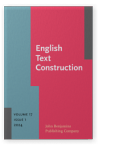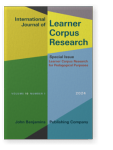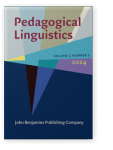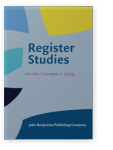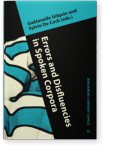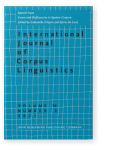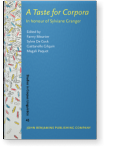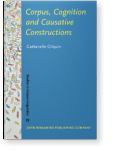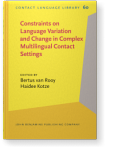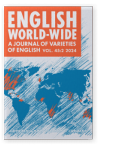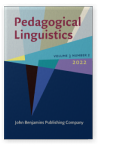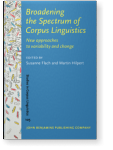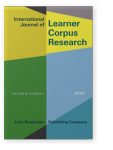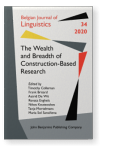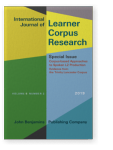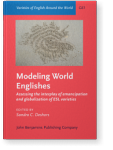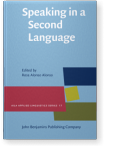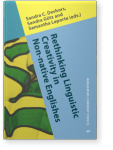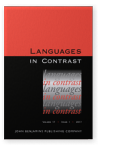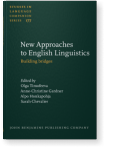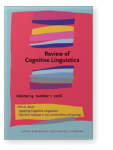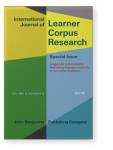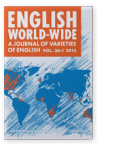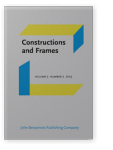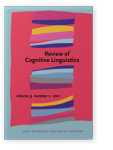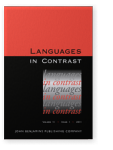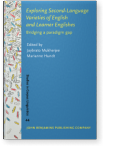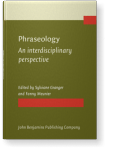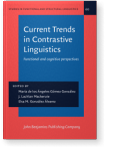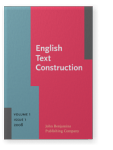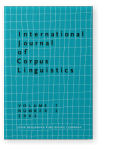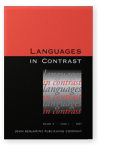Gaëtanelle Gilquin
List of John Benjamins publications for which Gaëtanelle Gilquin plays a role.
Journals
ISSN 2215-1478 | E-ISSN 2215-1486
ISSN 2665-9581 | E-ISSN 2665-959X
Errors and Disfluencies in Spoken Corpora
Edited by Gaëtanelle Gilquin and Sylvie De Cock
[Benjamins Current Topics, 52] 2013. v, 172 pp.
Subjects Corpus linguistics | Language acquisition | Multilingualism | Psycholinguistics
Errors and Disfluencies in Spoken Corpora
Edited by Gaëtanelle Gilquin and Sylvie De Cock
Special issue of International Journal of Corpus Linguistics 16:2 (2011) v, 158 pp.
Subjects Computational & corpus linguistics
A Taste for Corpora: In honour of Sylviane Granger
Edited by Fanny Meunier, Sylvie De Cock, Gaëtanelle Gilquin and Magali Paquot
[Studies in Corpus Linguistics, 45] 2011. xv, 295 pp.
Subjects Corpus linguistics | Theoretical linguistics
Corpus, Cognition and Causative Constructions
Gaëtanelle Gilquin
[Studies in Corpus Linguistics, 39] 2010. xvii, 326 pp.
Subjects Cognition and language | Corpus linguistics | Semantics | Syntax | Theoretical linguistics
2024 Chapter 5. Lexical use in spoken New Englishes and Learner Englishes: The effects of shared and distinct communicative constraints Constraints on Language Variation and Change in Complex Multilingual Contact Settings, van Rooy, Bertus and Haidee Kotze (eds.), pp. 120–152 | Chapter
This chapter, set within the framework of constrained communication, investigates the linguistic effects, in terms of lexical use, of a number of shared and distinct communicative constraints that are thought to play a role in New Englishes and Learner Englishes. Relying on corpora of spoken… read more
2024 Constrained communication in EFL and ESL: The case of embedded inversion English World-Wide 45:2, pp. 196–223 | Article
This study relies on the constrained communication framework to compare the use of embedded inversion in English as a Foreign Language (EFL) and English as a Second Language (ESL). It is based on several (sub)corpora of EFL and ESL, but also reference corpora of native English, which differ… read more
2024 Chapter 6. The effect of directionality on lexico‑syntactic simplification in French><English student translation Constraints on Language Variation and Change in Complex Multilingual Contact Settings, van Rooy, Bertus and Haidee Kotze (eds.), pp. 153–190 | Chapter
This chapter reports on an exploratory case study designed to investigate lexico-syntactic simplification in French><English translations produced by students in two within-subjects language contact settings: Translation from the foreign language (FL) into the first language (L1) (FL>L1… read more
2022 Reflections on applied cognitive corpus linguistics Pedagogical Linguistics 3:2, pp. 193–200 | Article
This article is a response to the commentaries written in reaction to my target article “Cognitive corpus linguistics and pedagogy: From rationale to applications”. It focuses on some issues raised by several commentators: the complexity of applying cognitive corpus linguistics in the language… read more
2022 Cognitive corpus linguistics and pedagogy: From rationale to applications Pedagogical Linguistics 3:2, pp. 109–142 | Article
This article deals with applied cognitive corpus linguistics, that is, the combined use of cognitive linguistics and corpus linguistics for pedagogical purposes. It describes the main features of each framework in terms of teaching applications and underlines their complementarity. Through… read more
2022 Diachronic learner corpus research: Examining learner language through the lens of time Broadening the Spectrum of Corpus Linguistics: New approaches to variability and change, Flach, Susanne and Martin Hilpert (eds.), pp. 40–67 | Chapter
This paper argues for a diachronic approach to the study of learner language and provides a first exploration of the evolution of English as a foreign language over the last twenty-five years, relying on a corpus resource specifically designed for the short-term diachronic analysis of learner… read more
2020 In search of constructions in writing process data The Wealth and Breadth of Construction-Based Research, Colleman, Timothy, Frank Brisard, Astrid De Wit, Renata Enghels, Nikos Koutsoukos, Tanja Mortelmans and María Sol Sansiñena (eds.), pp. 99–109 | Article
This article explores the possibility of identifying mentally stored constructions in writing process data, that is, data that reproduce the process through which a text is written. The unit that serves as a basis for the identification of constructions is the burst of writing, which corresponds… read more
2019 Light verb constructions in spoken L2 English: An exploratory cross-sectional study Corpus-based Approaches to Spoken L2 Production: Evidence from the Trinity Lancaster Corpus, Brezina, Vaclav, Dana Gablasova and Tony McEnery (eds.), pp. 181–206 | Article
Light verb constructions (LVCs), that is, combinations like take a walk or make a choice, are often claimed to be problematic for non-native speakers of English. In this paper, spoken data from the Trinity Lancaster Corpus are used to explore the use of these constructions across different… read more
2018 Modeling World Englishes in the 21st century: New reflections on model-making Modeling World Englishes: Assessing the interplay of emancipation and globalization of ESL varieties, Deshors, Sandra C. (ed.), pp. 281–294 | Chapter
This chapter seeks to bring together all the contributions in the volume. We identify converging lines of argumentation and findings across the studies featured in the book and we show how the approaches they adopt and the linguistic patterns they uncover shed new light on globalized Englishes, the… read more
2018 Chapter 6. Exploring the spoken learner English constructicon: A corpus-driven approach Speaking in a Second Language, Alonso, Rosa Alonso (ed.), pp. 127–152 | Chapter
This study, which is set in the field of Applied Construction Grammar, seeks to identify the constructions that are typical of higher intermediate to advanced spoken learner English. It does so by relying on the recurrent sequences of part-of-speech (POS) tags extracted from the Louvain… read more
2018 American and/or British influence on L2 Englishes – Does context tip the scale(s)? Modeling World Englishes: Assessing the interplay of emancipation and globalization of ESL varieties, Deshors, Sandra C. (ed.), pp. 187–216 | Chapter
Taking Mair’s (2013) World System of Englishes as a starting point, this chapter seeks to investigate whether American English is a more important source of influence than British English for the other varieties of English, including English as an institutionalised second language and English as a… read more
2018 Detecting innovations in a parsed corpus of learner English Rethinking Linguistic Creativity in Non-native Englishes, Deshors, Sandra C., Sandra Götz and Samantha Laporte (eds.), pp. 47–74 | Article
In research on L2 English, recent corpus-based studies indicate that some nonstandard forms are shared by indigenized (ESL) and foreign (EFL) varieties of English, which challenges the idea of a clear dichotomy between innovation and error. We present a data-driven large-scale method to detect… read more
2017 The clustering of discourse markers and filled pauses: A corpus-based French-English study of (dis)fluency Languages in Contrast 17:1, pp. 69–95 | Article
This article presents a corpus-based contrastive study of (dis)fluency in French and English, focusing on the clustering of discourse markers (DMs) and filled pauses (FPs) across various spoken registers. Starting from the hypothesis that markers of (dis)fluency, or ‘fluencemes’, occur more… read more
2016 Discourse markers in L2 English: From classroom to naturalistic input New Approaches to English Linguistics: Building bridges, Timofeeva, Olga, Anne-Christine Gardner, Alpo Honkapohja and Sarah Chevalier (eds.), pp. 213–249 | Article
This chapter investigates how the context of acquisition, and more precisely the amount of naturalistic input received, may influence non-native speakers’ knowledge of English discourse markers. It considers three levels of analysis, from the more individual (foreign language learners having spent… read more
2016 Review of Boas & Gonzálvez-García (2014): Romance perspectives on Construction Grammar Applying Cognitive Linguistics: Figurative language in use, constructions and typology, Piquer-Píriz, Ana M. and Rafael Alejo-González (eds.), pp. 235–245 | Review
2016 Detecting innovations in a parsed corpus of learner English Linguistic Innovations: Rethinking linguistic creativity in non-native Englishes, Deshors, Sandra C., Sandra Götz and Samantha Laporte (eds.), pp. 177–204 | Article
In research on L2 English, recent corpus-based studies indicate that some non-standard forms are shared by indigenized (ESL) and foreign (EFL) varieties of English, which challenges the idea of a clear dichotomy between innovation and error. We present a data-driven large-scale method to detect… read more
2015 At the interface of contact linguistics and second language acquisition research: New Englishes and Learner Englishes compared English World-Wide 36:1, pp. 91–124 | Article
This paper examines the possible interface between contact linguistics and second language acquisition research by comparing the institutionalized second-language varieties of English known as “New Englishes” and the foreign varieties of English called “Learner Englishes”. On the basis of corpus… read more
2013 Making sense of collostructional analysis: On the interplay between verb senses and constructions Constructions and Frames 5:2, pp. 119–142 | Article
This paper looks at the ways of refining the technique of collostructional analysis, and more precisely multiple distinctive collexeme analysis, by taking word senses into account. It presents the main results of a sense-based multiple distinctive collexeme analysis of the non-finite verb slot of… read more
2013 Errors and disfluencies in spoken corpora: Setting the scene Errors and Disfluencies in Spoken Corpora, Gilquin, Gaëtanelle and Sylvie De Cock (eds.), pp. 1–32 | Article
2011 Putting corpora to good uses: A guided tour A Taste for Corpora: In honour of Sylviane Granger, Meunier, Fanny, Sylvie De Cock, Gaëtanelle Gilquin and Magali Paquot (eds.), pp. 1–6 | Article
2011 Review of Boas (2010): Contrastive Studies in Construction Grammar Review of Cognitive Linguistics 9:2, pp. 429–438 | Review
2011 From EFL to ESL: Evidence from the International Corpus of Learner English Exploring Second-Language Varieties of English and Learner Englishes: Bridging a paradigm gap, Mukherjee, Joybrato and Marianne Hundt (eds.), pp. 55–78 | Article
This chapter revisits the dichotomy that is traditionally made in Second Language Acquisition (SLA) research between English as a Foreign Language (EFL) and English as a Second Language (ESL) and argues, on the basis of data from the International Corpus of Learner English, that it should be viewed… read more
2011 Errors and disfluencies in spoken corpora: Setting the scene Errors and Disfluencies in Spoken Corpora, Gilquin, Gaëtanelle and Sylvie De Cock (eds.), pp. 141–172 | Article
2008 16. Free and bound prepositions in a contrastive perspective. The case of with and avec Phraseology: An interdisciplinary perspective, Granger, Sylviane and Fanny Meunier (eds.), pp. 259–274 | Article
The starting point of this chapter is the observation that the French preposition avec, which is generally considered as the translational equivalent of with, is rarely used as a translation of with in parallel corpus data. A more detailed analysis of the corpus data reveals that polysemy partly… read more
2008 Causative make and faire: A case of mismatch Current Trends in Contrastive Linguistics: Functional and cognitive perspectives, Gómez González, María de los Ángeles, J. Lachlan Mackenzie and Elsa M. González Álvarez (eds.), pp. 177–201 | Article
This chapter compares the causative verb make, as used in verbal periphrastic causative constructions, with its intuitive equivalent in French, faire. Relying on a combination of comparable and parallel corpus data, it investigates the syntactic, semantic and lexical features of the English and… read more
2008 Too chatty: Learner academic writing and register variation English Text Construction 1:1, pp. 41–61 | Article
The study reported on in this paper uses corpus data in order to examine how upper-intermediate to advanced EFL learners from a wide range of mother tongue backgrounds perform a number of rhetorical functions particularly prominent in academic discourse, and how this compares with native academic… read more
2002 Automatic retrieval of syntactic structures: The quest for the Holy Grail International Journal of Corpus Linguistics 7:2, pp. 183–214 | Article
The study of complex grammatical patterns tends to be neglected by corpus linguists, the main reason being that such phenomena are much more difficult to extract from a corpus than simple words or tags. I demonstrate in this article that, although the desirable parsed corpora and appropriate… read more
2001 The Integrated Contrastive Model: Spicing up your data Approaches to Languages in Contrast, Johansson, Stig (ed.), pp. 95–123 | Article
This article shows how the approach of Contrastive Analysis can be combined with that of Contrastive Interlanguage Analysis in what has been called the Integrated Contrastive Model (Granger 1996a). Through the illustration of English and French causative constructions, it is demonstrated that… read more
